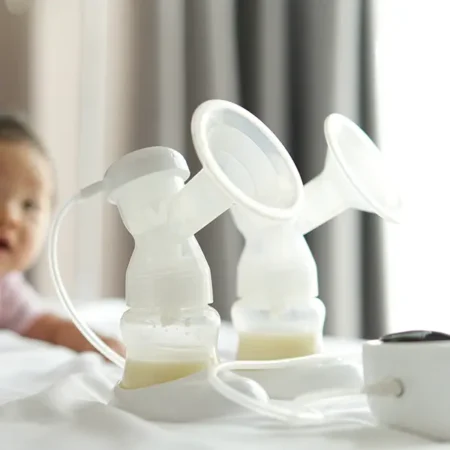Many new parents experience postpartum breast engorgement when their milk comes in.
Some common questions that they have include: How much should you pump to relieve engorgement? What’s the difference between engorgement and mastitis? Can you prevent engorgement when you’re exclusively pumping?
Here are some information and tips that will hopefully help.

This post may contain affiliate links, which means that if you click through and make a purchase, I’ll be compensated at no additional cost to you. I only recommend products I love! More info here.
What Is Engorgement?
Engorgement occurs when breasts feel overfull with milk, which can be uncomfortable or painful. When this happens, it’s usually at one of two different times – when your milk first comes in, or when you wean.
Engorgement usually lasts anywhere from a day to a few weeks.
What are the Symptoms of Engorgement?

Engorgement can occur in one or both breasts. Some of the common symptoms include:
- Your breast may feel hard (like your forehead), or there might be hard spots
- Skin on the breast may feel stretched, and be shiny
- Your breast may be warm, tender, and/or throbbing
- You may have a low-grade fever
Note: Because axillary breast tissue can sometimes extend up to your armpit, engorgement may not be limited to the breasts.
What are the differences between engorgement and mastitis?
It can be tricky to tell the difference between the two if you have a fever, as both mastitis and engorgement present with low-grade fevers and breast pain.
However, the fever for mastitis tends to be higher (101.3°F or greater) and also is accompanied by chills, general malaise, and flu-like aching.
If you have any of these, the issue is more likely mastitis than engorgement. More on treating mastitis here.
What are the differences between engorgement and a blocked duct?
It can also be difficult to tell the difference between engorgement and plugged milk ducts if you have “hard spots” in your breasts that feel like they may be lumps.
The major difference between the two is that with a clogged duct, usually you’ll have very localized pain in the area of the lump. Putting pressure on the lump will really hurt.
Engorgement is a more general pain encompassing the entire breast, and not usually focused at the spot of a single lump.
More on treating clogged milk ducts here.
How Should You Treat Engorgement?
Usually, you don’t have to do anything to “fix” the engorgement – it should resolve on its own within a few days to a few weeks.
However, there are some things that you can do to manage the discomfort associated with it. These include:
- Try warm compresses or a short shower before feedings, though only briefly (less than 5 minutes) as too much warmth can increase the swelling
- Use cool compresses before/after feedings to ease some discomfort
- Try using cabbage leaves on your breasts (see how here). The amino acids in the cabbage may help open capillaries and improve blood flow, which decreases tissue congestion, relieves inflammation, and allows milk to “flow” more freely
- Consider taking Ibuprofen for inflammation and pain (it’s safe for breastfeeding)
- If you are struggling with getting a letdown while pumping (if you’re pumping and nothing is coming out, even though you feel engorged), try either hand expression or a manual pump to see if that helps you get started. A lactation massager* might also be helpful
- You can also try Reverse Pressure Softening (RPS) to get the milk flowing
- Doing breast compressions – just moving your hands around and squeezing your breasts – may help you empty them more effectively
- If you are exclusively pumping, make sure to stick to your pumping schedule, as you want to make sure to empty your breasts consistently.
(*The lactation massager I recommend is available on amazon, or you can also get a 10% discount buying directly from LaVie with the promo code EPUMP.)
Engorgement and Pumping
One common question: Is it possible you could remove “too much” milk and make the engorgement worse?
Pumping, hand expressing, or nursing to comfort prevents the negative consequences of retained milk. Relieving the milk pressure will not make engorgement worse.
So how much should you pump to relieve engorgement?
Establishing an oversupply may be a concern in some situations, though this is less of an issue if you are exclusively pumping than if you are nursing.
If you’re a nursing mom, I would suggest pumping until you are comfortable.
If you’re an exclusive pumper, I would stick to your pumping schedule, but pump to comfort in between if necessary.
How to Prevent Engorgement While Exclusively Pumping
You can’t always avoid engorgement, but here are a few things that you can do to minimize your changes of experiencing it.
The best way for exclusive pumpers to prevent engorgement when your milk comes in is to stick to your pumping schedule as much as possible, and make sure that the schedule is frequent enough.
When you have a newborn, you should be pumping 7-10 times per day, for a total of 120 minutes per day.
When it’s time for you to wean from the pump, make sure to avoid weaning abruptly or cold turkey if at all possible to prevent engorgement. Plan to start dropping pumping sessions early enough that you can be weaned from the pump before any deadline you may have, such as going back to work, travel, etc. Generally speaking, you’ll want to give yourself about a week per session.
An overview of how to gradually wean from the pump is available here.
Have you dealt with engorgement? Tell us what happened (and how you treated it) in the comments!
References- Bonyata, Kelly, IBCLC. “Engorgement.” https://kellymom.com/bf/concerns/mother/engorgement/
- Bonyata, Kelly, IBCLC. “Plugged Ducts and Mastitis.” https://kellymom.com/bf/concerns/mother/mastitis/
- Flora, Becky, IBCLC. “Prevention and Treatment of Engorgement.” https://www.motherandchildhealth.com/breastfeeding/prevention-and-treatment-of-engorgement/
- Wilson-Clay, Barbara. “Relieving and Treating Engorged Breasts.” https://www.medelabreastfeedingus.com/tips-and-solutions/47/relieving-and-treating-engorged-breasts














